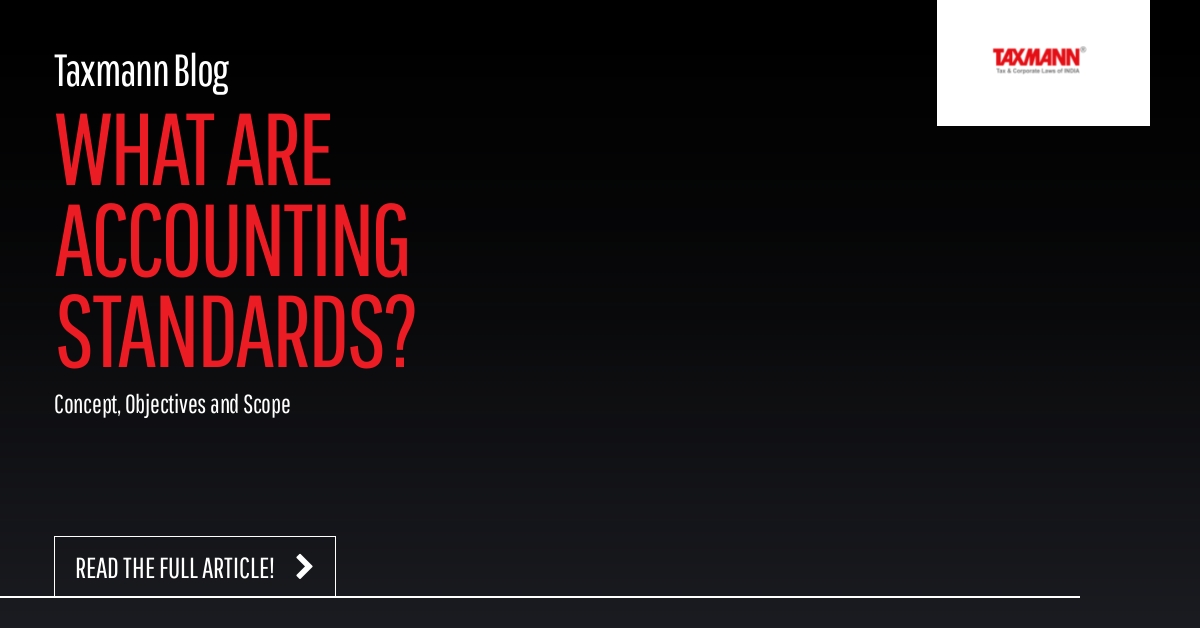What are Accounting Standards (AS)?
- Blog|Account & Audit|
- 3 Min Read
- By Taxmann
- |
- Last Updated on 30 September, 2023
Table of Contents
- Introduction
- Meaning of Accounting Standard (AS)
- Coverage of AS
- Need of AS
- Scope of AS
- Objectives and advantages of AS

1. Introduction
An Accounting Standard is a selected set of accounting policies or broad guidelines regarding the principle and methods to be chosen out of several alternatives on a particular issue.
Standards conform to applicable laws, customs, usages and business environment.
Hence, there is no universally acceptable set of standards. Even standard on same issue allows more than one accounting policy to be followed.
Therefore, to reduce the alternatives to acceptable few and to recommend the principles and procedures to be followed and disclosures to be made in financial statement, the Institute of Chartered Accountants of India (ICAI) issues Accounting Standards each one of which covers a particular point or area of accounting.
2. Meaning of Accounting Standard (AS)
It is an authoritative statement issued by ICAI (The Institute of Chartered Accountants of India) a premier body of Accounting in our country.
It deals with the accounting issues related to a particular area which that standard wants to address.
3. Coverage of AS
AS generally covers one or more of the following three things related to the subject-matter of AS:
-
- Recognition: How and when to account/recognize the relevant item. It can provide more than one alternatives also. Whether to treat an item as asset or as expense.
- Measurement: How to measure the particular item, what to include, what not to include in the valuation.
- Disclosure: The information to be disclosed in the annual financial statement regarding that area.
4. Need of AS
Accounts gives information to various groups.
The financial statement can serve the interest of different interest groups only if there is uniformity and full disclosure of relevant information.
There are various alternatives regarding accounting treatment and valuation norms which may be used by an entity.
Hence AS tries to reduce this alternative by allowing only those alternatives which fulfils the basic qualitative characteristics of true and fair financial statements and lays down the minimum information to be disclosed and manner of disclosure.
5. Scope of AS
Responsibility for the preparation of financial statement and for adequate disclosure is that of the management of the enterprise.
The Auditor’s responsibility is to form his opinion and report on such financial statements.
Efforts will be made to issue Accounting Standards which are in conformity with the provisions of the applicable laws, customs, usages and business environment of our country.
However, if due to subsequent amendments in the law, a particular Accounting Standard is found to be not in conformity with such law, the provision of the said law will prevail and the financial statements should be prepared in conformity with such law.
The Accounting Standards are intended to apply only to items which are material.
The date from which a particular Standard will come into effect, as well as the class of enterprises to which it will apply, will also be specified by the Institute.
6. Objectives and advantages of AS
An Accounting Standard is a selected set of accounting policies or broad guidelines regarding the principles and methods chosen out of several alternatives.
The main objectives of Accounting Standards is to establish standards which have to be complied with to ensure that financial statements are prepared in accordance with generally accepted accounting principles.
Accounting standard seek to suggest rules and criteria of recognition, measurement & disclosure.
These standards harmonize the diverse accounting policies and practices at present in use in India.
The main advantage of setting accounting standards is that the adoption and application of Accounting Standards ensure uniformity, comparability and qualitative improvement in the preparation and presentation of financial statements.
Disclaimer: The content/information published on the website is only for general information of the user and shall not be construed as legal advice. While the Taxmann has exercised reasonable efforts to ensure the veracity of information/content published, Taxmann shall be under no liability in any manner whatsoever for incorrect information, if any.

Taxmann Publications has a dedicated in-house Research & Editorial Team. This team consists of a team of Chartered Accountants, Company Secretaries, and Lawyers. This team works under the guidance and supervision of editor-in-chief Mr Rakesh Bhargava.
The Research and Editorial Team is responsible for developing reliable and accurate content for the readers. The team follows the six-sigma approach to achieve the benchmark of zero error in its publications and research platforms. The team ensures that the following publication guidelines are thoroughly followed while developing the content:
- The statutory material is obtained only from the authorized and reliable sources
- All the latest developments in the judicial and legislative fields are covered
- Prepare the analytical write-ups on current, controversial, and important issues to help the readers to understand the concept and its implications
- Every content published by Taxmann is complete, accurate and lucid
- All evidence-based statements are supported with proper reference to Section, Circular No., Notification No. or citations
- The golden rules of grammar, style and consistency are thoroughly followed
- Font and size that’s easy to read and remain consistent across all imprint and digital publications are applied



 CA | CS | CMA
CA | CS | CMA
